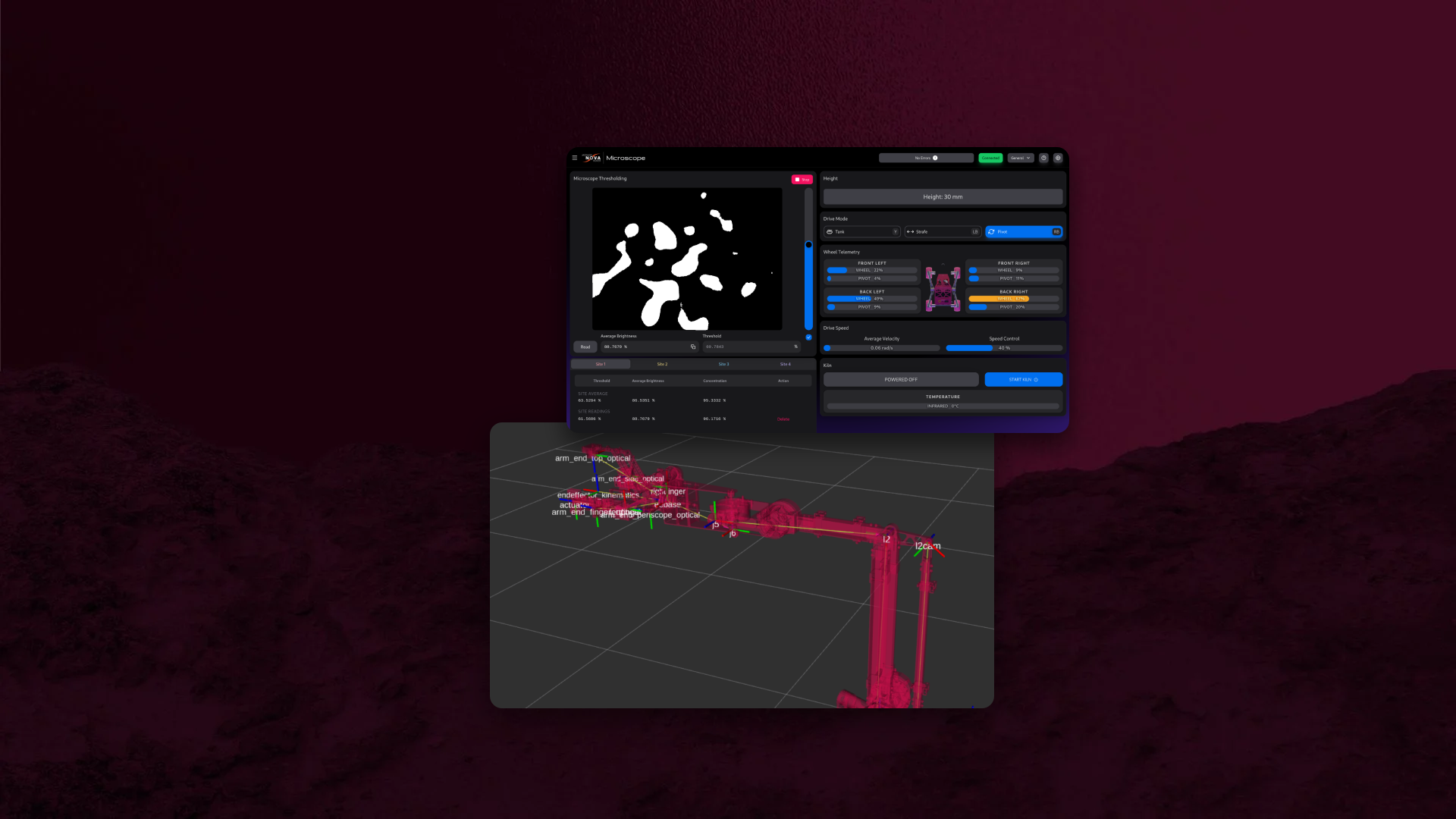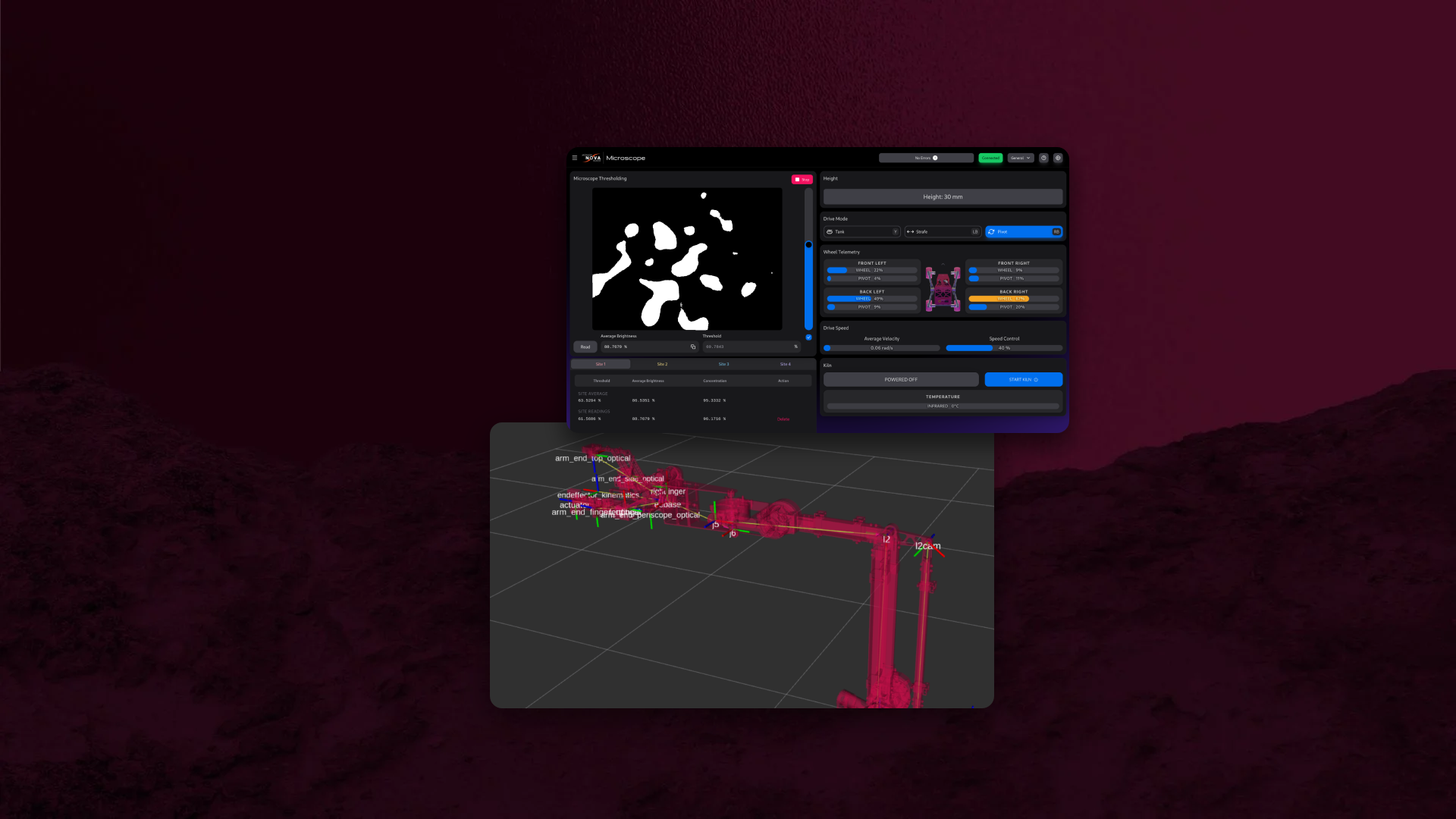
Interested in joining our team?
Recruitment for Monash Nova Rover’s 2025-26 design cycle has closed. Keep an eye out on our social media for any updates about our next recruitment round! In the meantime, have a read below to find out more about our team.
Have any questions? We’d love to hear from you at novaroverteam@monash.edu
Applications have now closed!
Read more about the subteams below, and find out more about what skills will make you an ideal candidate. We strive to build a supportive learning environment, so don’t be worried if you don’t have all of the skills listed. Our team members are more than happy to help you upskill during your time here!
Find out more about each subteam!
-

Adaptive Payload
-

Arm
-

Chassis
-

Electrical
-

Science
-

Software
-

Autonomous
-

Business & Media
-

Outreach
Adaptive Payload
The Adaptive Payload (AP) subteam is named for its focus on versatility and innovation. Our role is to design and develop specialised payloads that enable the rover to successfully complete diverse and challenging tasks such as excavation, delivery, and exploration.
Current projects include a Scraper for regolith and rock excavation, a Tile Placer for the Excavation & Construction task, the Automount — a modular, easily adjustable mount for the autonomous team’s depth camera, and Galah, our aerial drone designed to support the rover during the Extreme Delivery mission.
Beyond addressing immediate mission requirements, the subteam is committed to advancing capability through research, development, and rigorous prototyping. By experimenting with materials, refining designs, and testing new tools, we aim to ensure the rover remains prepared for future challenges while continuously developing our own technical expertise. The AP subteam also provides opportunities to gain hands-on experience in a wide range of manufacturing techniques including composites, welding, and machining skills.
-
Any CAD experience such as Solidworks, Onshape
3D printing experience
Hand tool and power tool experiencePersonal mechanical projects
Manual machining
Arm
The Arm subteam designs, manufactures, programs, and electrically integrates the robotic arm which is used for dexterous manipulation tasks on the rover. This year, we will be finalising our new arm design focused on precision, strength, and reliability so that we can tackle competitions inspired by space exploration missions!
New recruits will develop CAD and 3D printing skills, with opportunities to get hands-on experience with machining and fabrication. You’ll also collaborate with the software subteam on motion control and kinematics and with the electrical subteam on firmware and system integration.
If you are eager to grow your engineering skills and help us bring our new arm to life we strongly encourage you to apply and follow our progress!
-
CAD experience (Eg. Solidworks, Fusion 360, Onshape)
3D printing
Personal engineering projects
Hand tool experience
Basic circuit knowledge (Eg. ENG1013)
Interest in software programming
Basic robotics knowledge (Eg. TRC2201)
Chassis
The Chassis subteam is responsible for the design and development of the core mechanical rover systems. We aim to design a rover that is lightweight and strong, capable of handling extreme rocky and sandy terrains while protecting the core electrical systems. Chassis is responsible for the physical interfaces and mounting of our robotic arm, science and other payloads. The chassis consists of three main components: the body, suspension, and drive train, acting as a streamlined interface between the core rover and its modular subsystems.
We are looking for passionate team members looking to further develop CAD and 3D printing skills, become involved in the machining/fabrication of rover components, development and maintenance of gearboxes and core rover.
-
Solidworks (or any other CAD software)
3D printing
Personal engineering/mech/mechatronic projects
Electrical
The Electrical subteam is responsible for the design, assembly and maintenance of the rover’s electrical systems. We facilitate communication between the rover and the base, design and assemble circuit boards, develop firmware, troubleshoot our systems, and manage the batteries used to power the rover. We produce a robust system that is capable of running our computers, motor drivers, robotic arm, scientific payload, and many other elements across the rover.
If you're interested in one or many of these areas, and have a good work ethic and time to dedicate to the team, we'd love to hear from you!
-
Circuit analysis
Microcontroller experience (e.g. dsPIC, STM32, Arduino)
Embedded systems firmware development
PCB design experience (e.g. KiCad, Altium)
Soldering and crimping experience
Science
The Science subteam is composed of both payload scientists and payload engineers. We develop payloads which contain various analytical instruments, mechanical components and electrical systems. Team members conduct research into Lunar and Martian environments, and design, validate, and manufacture analytical instruments and extraction mechanisms. We combine mechanical, electrical and scientific components into a system capable of analysing and extracting resources, and detecting life.
-
Any CAD software
3D printing experience
Basic electrical prototyping skills (e.g., soldering, using motors/sensors, Arduino, STM 32)
Understanding of basic mechanical principles (e.g., loads, moments)
-
Understanding of analytical chemistry and knowledge of different analytical techniques
Knowledge of biochemistry (e.g., proteins, enzymes)
Ability to plan, execute and document scientific experiments, including testing procedures and spectral analysis
Knowledge/interest in astrobiology
Knowledge/interest in lunar and martian geology
Knowledge/interest in engineering
Software
The Software Subteam is responsible for developing and maintaining all the software systems used to run and operate the rover. This includes both on-rover systems that move various types of motors, take readings, and operate custom-designed electronic components and off-rover systems that input control, receive data, and display rover state. This also includes maintaining the rover's Linux operating system, package architecture, compatibility for miscellaneous hardware, radio communications, base station computers and much more. Our team's projects primarily focus on the following components:
Adding features to the Graphical User Interface using React and Typescript.
Creating or editing ROS2 nodes used to communicate between control interfaces (GUI, Gamepad, etc.) to the rover's microcontrollers. This includes arm, drive, sensors, actuators, pumps, light controls and so much more. These are written in either Python or C++.
Maintaining software packages and compatibility with new and existing rover hardware. This utilises Nix, Linux and hardware skills to create a reliable software environment.
Overarching projects work on improving our software architecture, code maintainability and migrating to utilise industry-accepted coding packages.
-
Experience in at least 1 programming language (Python, C++ preferred)
VS Code or similar code IDE.
Git - Version Control, ideally with experience in a team setting
-
Linux - Any level of experience is useful.
ROS2 - This is the main library we use to communicate and control the rover, it is available for Python and C++. No prior experience is required.
Nix / NixOS - This is our package management system and OS. No prior experience is required.
React/JavaScript / TypeScript - Used to develop our Graphical User Interface GUI that controls the rover.
Unity - Simulation development.
To learn any of the skills mentioned, here are some resources to get you started:
-
Easy way to learn basic Linux commands: https://overthewire.org/wargames/bandit/bandit0.html
-
Get started with NixOS: https://nixos.org/
Great resources to learn Nix: https://nixos.org/guides/nix-pills/, https://zero-to-nix.com/, https://ianthehenry.com/posts/how-to-learn-nix/introduction/
-
See here to get started with ROS2: https://docs.ros.org/en/jazzy/index.html
This website has some more practical ROS2 tutorials: https://articulatedrobotics.xyz/
Docs with tutorials for ROS2 Control: https://control.ros.org/master/index.html
Getting started docs for Nav: https://navigation.ros.org/getting_started/index.html
Autonomous
Autonomous Task (ARCh) and the Autonomous Navigation Mission (URC). Members will work on a wide range of problems, including but not limited to:
Integration of sensors and sensor data through mapping and localisation systems.
Designing and implementing various behaviours through behaviour trees.
Development of the team’s simulation capabilities.
Recruits will gain hands-on experience developing autonomous systems and integrating them into a real rover. In the process, recruits will learn how to use the ROS2 framework and accompanying packages through a mix of C++ and Python, along with how to integrate and debug sensors and systems.
Additionally, members will have the opportunity to work closely with other subteams such as Software and Electrical on the infrastructure supporting the autonomous stack, such as networks, firmware, simulations, etc.
-
Experience in at least 1 programming language (Python, C++ preferred)
VS Code or similar code IDE.
Git / GitHub (ideally with experience in a team setting).
Linux - Any level of experience is useful.
ROS2 and Nav2 - This is the main library we use to communicate and control the rover, it is available for Python and C++. No prior experience is required.
Nix / NixOS - This is our package management system and OS. No prior experience is required.
Unity - Simulation development.
To learn any of the skills mentioned, here are some resources to get you started:
-
Easy way to learn basic Linux commands: https://overthewire.org/wargames/bandit/bandit0.html
-
Get started with NixOS: https://nixos.org/
Great resources to learn Nix: https://nixos.org/guides/nix-pills/, https://zero-to-nix.com/, https://ianthehenry.com/posts/how-to-learn-nix/introduction/
-
See here to get started with ROS2: https://docs.ros.org/en/jazzy/index.html
This website has some more practical ROS2 tutorials: https://articulatedrobotics.xyz/
Docs with tutorials for ROS2 Control: https://control.ros.org/master/index.html
Getting started docs for Nav: https://navigation.ros.org/getting_started/index.html
Business & Media
The Business and Media subteam plays a key role in managing relations with external partners of the team, as well as supporting the team from all non-technical aspects which includes but is not limited to marketing, design, merchandise and media production. Business and Media are also in charge of the creation of our Distributed Field Test (DFT) and Systems Acceptance Review (SAR) videos which are critical components of our competition submission.
Members of Business and Media can expect to identify potential sponsors and create tailored pitches and sponsorship packages, learn design philosophies through the creation of merchandise and visual assets for key documents, and work on large scale video projects which involve team collaboration, storyboarding, filming and editing.
If you are passionate about design and visual storytelling, or eager to improve your confidence in communicating with sponsors, Business and Media is an opportunity to do so!
-
Video production experience (Adobe Premiere Pro, DaVinci Resolve, Capcut, Blender, etc.)
Graphic design experience (Canva, Photoshop, etc.)
Any camera experience (DSLR, mirrorless, or phone photography/videography)
Sponsorship or business communication experience (email writing, outreach, partnerships)
Comfortable with public speaking, presenting, and event support
Outreach
The Outreach Division is responsible for representing Nova to the public through hands-on STEM workshops, school visits, and community events that showcase what engineering and robotics are really like in practice. We run engaging mini-rover workshops using custom-built kits designed in-house to spark curiosity and inspire students to explore engineering. A key focus of our work is promoting diversity in STEM through initiatives like the Pink Rover campaign, where we actively challenge stereotypes and foster inclusive conversations within the broader community.
-
Help plan and coordinate school visits, public events, and STEM workshops
Run hands-on outreach sessions, guiding students through mini-rover builds and activities
Contribute to the design and development of workshop content and rover kits
Communicate the outreach vision and values across the broader Nova team
Engage with schools, universities, and the public to represent Nova Rover’s mission
-
A passion for education, mentoring, or working with school students
A desire to promote diversity and inclusion in STEM fields
Excitement about robotics, space, or engineering, even without technical experience
Enjoyment of public speaking, presenting, or engaging with groups



